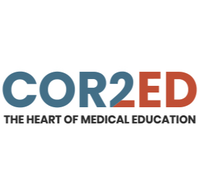
COR2ED The Heart of Medical Education
Our COR2ED channel brings together world-renowned medical experts to discuss and provide clear guidance on the latest scientific and clinical insights in various therapeutic areas, including oncology, cardiology, hemostasis, rare diseases, hemato-oncology, and endocrinology. At COR2ED, we are committed to providing balanced and evidence-based independent medical education to support healthcare ...
read more ↘ professionals in enhancing patient care. Many of our videos are created in collaboration with medical societies and patient advocacy groups.
↖ read less
read more ↘ professionals in enhancing patient care. Many of our videos are created in collaboration with medical societies and patient advocacy groups.
↖ read less
- Breast Cancer
- Lung Cancer
- GI Cancer
- GU Cancer
- Hematologic Oncology
- Other Oncology Videos
- OB-GYN
- Hemostasis and bleeding disorders
- Endocrinology
- Events
Video Player is loading.
Current Time 0:00
/
Duration 0:00
Loaded: 0%
0:00
Stream Type LIVE
Remaining Time -0:00
1x
- 0.5x
- 0.75x
- 1x, selected
- 1.25x
- 1.5x
- 1.75x
- 2x
- Chapters
- descriptions off, selected
- captions settings, opens captions settings dialog
- captions off, selected
This is a modal window.
Beginning of dialog window. Escape will cancel and close the window.
End of dialog window.
10 seconds
Playback speed
This is a modal window. This modal can be closed by pressing the Escape key or activating the close button.
Chemotherapy Strategies for mPDAC
17 views
March 6, 2025
This video, developed by Prof. Efrat Dotan and Prof. Shubham Pant, reviews the combination chemotherapy strategies available as 1st and 2nd line treatments for metastatic pancreatic ductal adenocarcinoma (PDAC) that have led to improved survival rates for these patients.
Topics covered in this video include:
• Key trial data for the combination chemotherapy strategies used as 1st and 2nd line treatments
• Cause of toxicities and strategies that can be used to improve tolerability
• Management of vulnerable patients
• Maintenance therapy
Download the slides and summary flashcard and access the accredited e-learning here: https://cor2ed.com/gi-connect/programmes/metastatic-pancreatic-ductal-adenocarcinoma-pdac/?media=1s
Key clinical takeaways:
• Pancreatic ductal adenocarcinoma (PDAC) is usually diagnosed at an advanced, incurable stage and has an extremely poor prognosis
• Systemic chemotherapy is the standard treatment for metastatic PDAC (mPDAC) but molecularly targeted treatments and immunotherapies may have a role for specific patients
• Treatment selection depends on several factors, including patients' performance status and co-morbidities. These should be considered alongside the efficacy and safety profiles of the different chemotherapy regimens
• Treatment strategies can be implemented to manage toxicities associated with the different chemotherapy regimens to enable a patient to stay on treatment for optimal efficacy
Topics covered in this video include:
• Key trial data for the combination chemotherapy strategies used as 1st and 2nd line treatments
• Cause of toxicities and strategies that can be used to improve tolerability
• Management of vulnerable patients
• Maintenance therapy
Download the slides and summary flashcard and access the accredited e-learning here: https://cor2ed.com/gi-connect/programmes/metastatic-pancreatic-ductal-adenocarcinoma-pdac/?media=1s
Key clinical takeaways:
• Pancreatic ductal adenocarcinoma (PDAC) is usually diagnosed at an advanced, incurable stage and has an extremely poor prognosis
• Systemic chemotherapy is the standard treatment for metastatic PDAC (mPDAC) but molecularly targeted treatments and immunotherapies may have a role for specific patients
• Treatment selection depends on several factors, including patients' performance status and co-morbidities. These should be considered alongside the efficacy and safety profiles of the different chemotherapy regimens
• Treatment strategies can be implemented to manage toxicities associated with the different chemotherapy regimens to enable a patient to stay on treatment for optimal efficacy
Comments 0
Login to view comments.
Click here to Login
GI Cancer






























